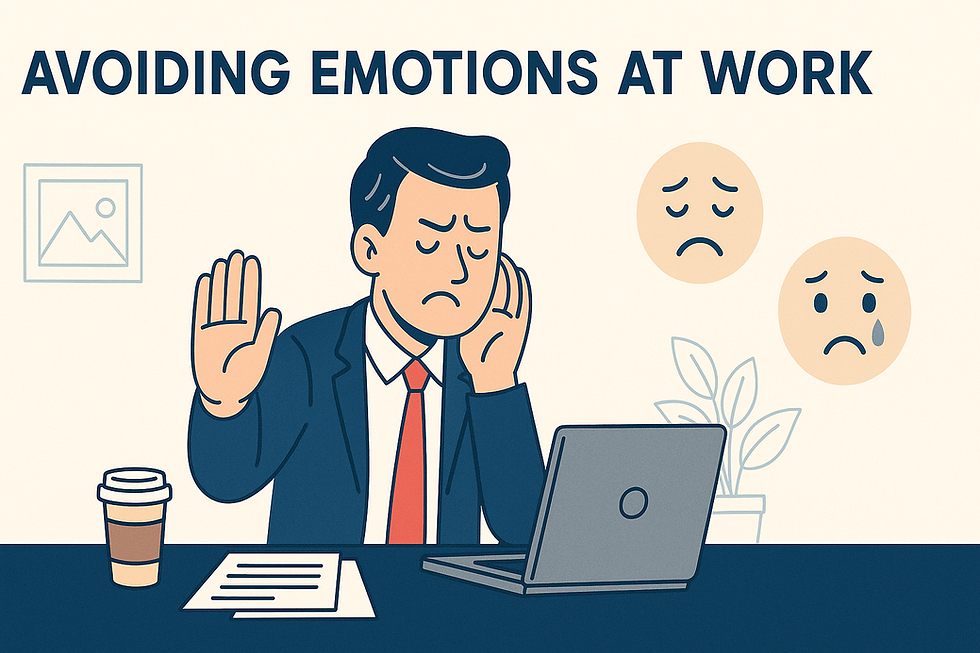Did you know this about emotions?
- Halle Simpson
- Mar 19, 2024
- 3 min read
Updated: Aug 6

How well do you understand your own emotions?
That might seem like a strange question to begin with, but understanding our emotions is a key component of self-awareness. And according to a study at Cornell University, self-awareness is the number one predictor of executive success.
Here’s the thing, we all have patterns of emotions and behavior that are wired into our nervous system, so they’re on autopilot. They’re happening inside without even a care, in the same capacity that our heart is beating or our eyes are blinking. Some patterns work positively on our behalf and others show up as self-created obstacles that prevent our effectiveness and growth.
What is an unhelpful, autopilot pattern that you would like to change?
I’m a big fan of The Holistic Psychologist, Dr Nicole LePera and am always amazed at the research she shares with her more than eight million followers. One recent Instagram post explained that most of the world is intellectualizing their feelings. Meaning, we can identify an emotion with our logical mind, almost checking a box that it’s present, but we’re not creating space to feel it in our bodies. And feelings (which contain the word “feel”), are meant to be felt and experienced so they flow through the body and can be released.
As a society, we are not very connected to the role our body plays in creating and experiencing our own emotions.
I recently attended a Somatic Coaching Workshop where they broke down that emotions are made up of a sensation in the body plus a thought we think:
Sensation + Thought = Emotion
Usually, this happens in a split second, so fast that we don’t even realize it’s multiple pieces taking place. Allow me to illustrate:
I was watching Indiana University basketball and they missed a clutch free throw with less than one minute on the clock. The wind was taken out of my sails (sensation in my chest) and we had a terrible free throw percentage (thought), so it made me worried (emotion) that we would lose the game.
Then Michigan State had the ball on the last possession and my stomach was in knots (sensation), our defense had been strong (thought), so I was filled with hope and anticipation (emotions) that we would rebound successfully to ensure an IU win…and we did!
Let’s look at it in business:
You submit a proposal for a potential new client and are waiting for an answer. There is tension and tightness you’re carrying in your shoulders (sensation), if you don’t get a “yes” you will have failed (thought), so you’re experiencing a ton of pressure (emotion) awaiting an answer.
A fellow team member has interrupted you for the umpteenth time in a meeting and your head is getting hot (sensation). If they do it one more time you’ll have no choice but to speak up (thought), because you’re so irritated (emotion) you just can’t handle it anymore.
What’s a “sensation + thought = emotion” scenario that you’ve experienced in the last two weeks?
Once you recognize the autopilot pattern that’s playing out, then there are opportunities to change the pattern. For instance…
…at the sensation level: When you notice a particular sensation arise, just feel the sensation and suspend the thoughts or judgments. You can then take action to move the sensation through your body so it gets released. You might go for a walk, take a break, stretch, do some deep breathing exercises, start journaling or talk to a trusted mentor.
…at the thought level: By identifying the thought you’re thinking, you can ask, “What if this isn’t true? If I look at this from another perspective, what else could I possibly think?” By exploring alternative thoughts, you can foster different (hopefully less severe or more helpful) emotions to arise.
The first part of coaching is observing and understanding what is happening. When we’re aware of what is taking place we also open our eyes to alternative choices we didn’t previously see.
Need help with your particular situation?
Plus a few other links of interest:
1. Could your team benefit from upgrading their leadership? Inquire about Leadership Essentials Academy, a 6-month leadership training & coaching cohort for new and emerging leaders.
2. Time for a new journal? Pick up a new copy of my Know Thyself Journal for daily support towards your most important intentions for the next 90 days.
3. Are you into individual assessments? Here is a link to take a free Core Values Assessment (CVI). It only takes 10 minutes and measures your innate, unchanging nature. Take it yourself and feel free to forward it to a friend, too.



